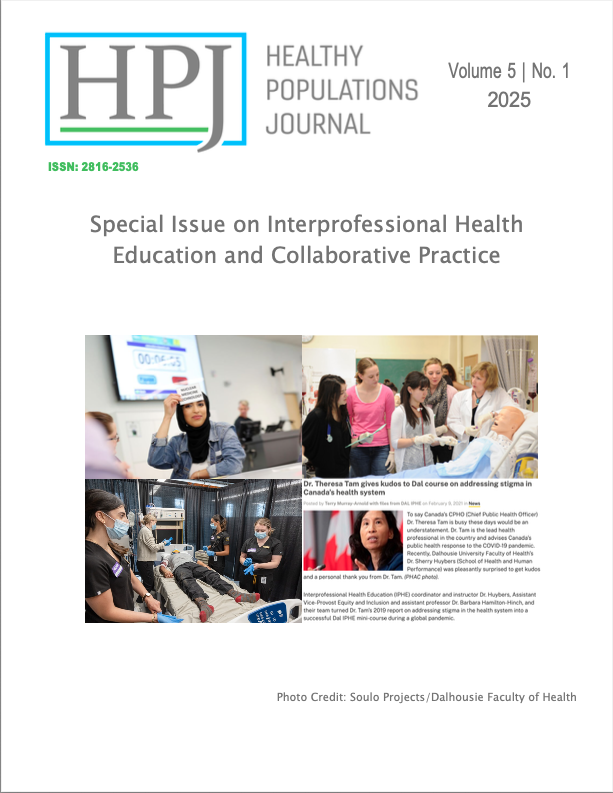Transforming FASD Diagnosis in Newfoundland and Labrador: A Community Collaborative Approach for Capacity Building and Network Development
DOI:
https://doi.org/10.15273/hpj.v5i1.12341Keywords:
fetal alcohol spectrum disorder, diagnosis, community innovation, interprofessional educationAbstract
This commentary delves into fasdNL's innovative work in establishing a comprehensive diagnostic network for fetal alcohol spectrum disorder (FASD) in Newfoundland and Labrador (NL). Although unparalleled in its complexity, FASD remains a persistently underdiagnosed and under-resourced lifelong condition. fasdNL, a community-based non-profit organization in NL, has significantly enhanced diagnostic capabilities and training for healthcare professionals, streamlined referral assessments, and addressed persistent gaps in FASD evaluation. The creation of fasdNL’s Diagnostic Network represents a significant step forward in improving FASD diagnosis and support within the province. fasdNL’s training program is grounded in the principles of Inter-Professional Health Education (IPHE), designed to foster collaboration among diverse health professionals. By emphasizing the importance of a multi-disciplinary approach to FASD diagnosis, the initiative enhances clinicians' capacity to work collaboratively in line with the Canadian FASD Diagnostic Guidelines. This training model not only improves diagnostic capacity but also promotes inter-professional practice by encouraging knowledge exchange and collaborative decision-making among healthcare providers. Further, it underscores the crucial role and potential of community organizations in addressing collaborative assessment and diagnostic processes by building on existing capacities within their regions.
References
Bell, E., Andrew, G., Di Pietro, N., Chudley, A. E., Reynolds, J. N., & Racine, E. (2016). It’s a shame! Stigma against fetal alcohol spectrum disorder: Examining the ethical implications for public health practices and policies. Public Health Ethics, 9(1), 65-77.
Choate, P., & Badry, D. (2018). Stigma as a dominant discourse in fetal alcohol spectrum disorder. Advances in Dual Diagnosis, 12(1/2), 36-52.
Cook, J. L., Green, C. R., Lilley, C. M., Anderson, S. M., Baldwin, M. E., Chudley, A. E., Conroy, J. L., LeBlanc, N., Loock, C. A., Lutke, J., Mallon, B. F., McFarlane, A. A., Temple, V. K., & Rosales, T. (2016). Fetal alcohol spectrum disorder: A guideline for diagnosis across the lifespan. Canadian Medical Association Journal, 188(3), 191-197. https://doi.org/10.1503/cmaj.141593
Doak, J., Katsikitis, M., Webster, H., & Wood, A. (2019). A fetal alcohol spectrum disorder diagnostic service and beyond: Outcomes for families. Research in Developmental Disabilities, 93, 103428.
Dunbar Winsor, K. (2021). An invisible problem: Stigma and FASD diagnosis in the health and justice professions. Advances in Dual Diagnosis, 14(1), 8-19.
Dunbar Winsor, K., & Morton Ninomiya, M. E. (2018). The past, present, and future of fetal alcohol spectrum disorder work in Newfoundland and Labrador: A landscape paper for change. Birth Defects Research, 110(16), 1215-1222. https://doi.org/10.1002/bdr2.1378
fasdNL. (2024). What we do. http://www.fasdnl.ca/whatwedo.html
Popova, S., Lange, S., Shield, K., Burd, L., & Rehm, J. (2019). Prevalence of fetal alcohol spectrum disorder among special subpopulations: A systematic review and meta-analysis. Addiction, 114(7), 1150-1172. https://doi.org/10.1111/add.14598
Reid, N., Dawe, S., Shelton, D., Harnett, P., Warner, J., Armstrong, E., & O'Callaghan, F. (2015). Systematic review of fetal alcohol spectrum disorder interventions across the life span. Alcoholism: Clinical and Experimental Research, 39(12), 2283-2295.
Statistics Canada. (2021). Census Profile, 2021 Census of Population. https://www12.statcan.gc.ca/census-recensement/2021/dp-pd/prof/details/page.cfm?Lang=E&SearchText=Newfoundland%20and%20Labrador&DGUIDlist=2021A000210&GENDERlist=1,2,3&STATISTIClist=1,4&HEADERlist=0
Wilhoit, L. F., Scott, D. A., & Simecka, B. A. (2017). Fetal alcohol spectrum disorders: Characteristics, complications, and treatment. Community Mental Health Journal, 53, 711-718. https://doi.org/10.1007/s10597-017-0104-0
Published
Issue
Section
License
Copyright (c) 2025 Katharine Dunbar Winsor, Heather Conran Paul, Laura Squires-Walsh

This work is licensed under a Creative Commons Attribution-NonCommercial 4.0 International License.
The journal aims to reduce barriers to publishing and sharing research and inequalities to accessing information.This journal provides immediate open access to its content on the principle that making research freely available to the public supports a greater global exchange of knowledge. The open-access nature of the journal means that there will be no charge for authors or readers to use the journal. The journal has a Creative Commons Attribution Non-Commercial (CCBYNC) attribution which allows the author (and others) to share and distribute their full-text article in other public domains, such as Google Scholar or Research Gate.

